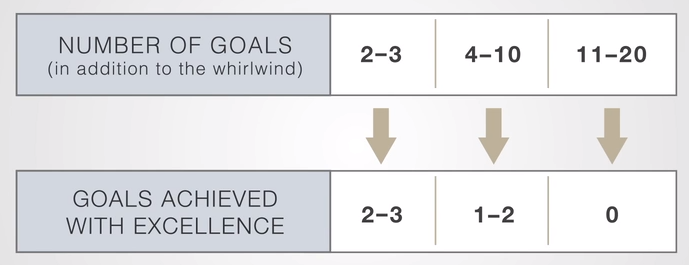3 Questions to Ruthlessly Prioritise Goals to Measure
by Stacey Barr |We cannot afford to measure everything. We have to be ruthless about what’s worth measuring. And to be ruthless, goals must pass the Should, Can, Will test.

Have you ever stood in the supermarket, staring at a bazillion different brands of washing powder, and feeling overwhelmed to the point of indecision? Too many choices vying for our attention is exhausting and paralysing. And too many goals and measures has the same effect.
Even with well-known and sage advice to the contrary, too many organisations still struggle with too many goals and too many measures. Leadership guru, Peter Drucker, has been quoted countless times on his advice that “the key to strategy is omission”. And in The 4 Disciplines of Execution, for example, the first discipline is to focus on the wildly important. This is based on the law of diminishing returns, where the more goals we have, the fewer we can achieve with excellence:
How can we ruthlessly prioritise what to measure?
Perhaps the perpetuation of our struggle with too many measures is a lack of a practical way to ruthlessly prioritise the goals truly worth measuring. If that’s true for your organisation, these three questions might give you that practical way:
- Is this a result that we should improve?
- Is this a result we can improve?
- Is this a result we will improve?
In PuMP, this is called the Should, Can, Will test. It’s part of the Measurability Tests technique we use on our goals, before we try to measure them. Here’s how it works:
1. Is this a result that we SHOULD improve?
Why would we bother measuring a goal that didn’t really matter? And no, not every goal does – or even can – matter. Sometimes it can feel like everything matters, though. And that makes it hard to prioritise which goals to give our attention to.
If a goal really matters, then it deserves our full attention to make sure it is achieved. But our attention has limits. We simply cannot care enough about anything when there’s too much to care about.
Before we measure a goal, it really SHOULD be important to achieve, now. That usually means it contributes directly to at least one of the top three outcomes that our organisation simply must achieve, with excellence. And therefore our approach to strategic planning needs to embrace this principle.
2. Is this a result we CAN improve?
Sometimes goals really do matter, but it might not be us that should own them. Consider these three levels of agency any team might have over a goal’s achievement (from Stephen Covey’s 7 Habits of Highly Effective People, in case you didn’t know):
- Circle of control: our actions can have almost 100% effect on achieving the goal
- Circle of influence: our actions will have less that 100% effect on achieving the goal, but definitely a good deal more than 0%
- Circle of concern: our actions will have no or negligible effect on achieving the goal
It’s okay if the goal is outside our circle of control – most things that really matter will be. They will be results that matter to a broader group of stakeholders, and usually no one group of people has full control over them. We don’t need control to create improvement; just influence.
Before we measure a goal, we need to check that we CAN have influence over its achievement. We need to be confident that whatever we decide to do, it has a realistic chance of making noticeable and worthwhile improvement in the goal.
3. Is this a result we WILL improve?
Even if our goal should be achieved, and you can achieve it through the influence that you have, it still might not be worth measuring. Not yet, anyway. Importance and influence are vital, but we have to take action to really achieve a goal.
To take the action needed to achieve the goal, we need to be sure we will give it the time and resources it needs. And enough of the time and resources needed to achieve it with excellence.
Before we measure a goal, we must be confident that we WILL allocate the budget and the project team, and get it done. But there’s more: Dean Spitzer, author of Transforming Performance Measurement, said this to me recently, when I explained the Should, Can, Will test to him:
“The human soul is composed of the mind and the emotions and the will. And we don’t understand the will. And yet the will is ultimately what causes us to do something or not do something. So you can want to do something. You can feel positively about doing it. But it’s ultimately the will that’s going to determine whether we do it. So to me, that question, “will”, is like the ultimate question. And that’s the one that I would say most organizations would say no to because they don’t have the will to do these things.”
— Dean Spitzer
This additional meaning of the word ‘will’ is also important to think about when you’re deciding if you truly will put in the effort to achieve the goal.
The Should, Can, Will test in action.
Dean Spitzer recently suggested we collaborate on measuring the health of families. It was a relevant outcome for his clients, in ministries, and they struggled with it. While the full collaboration is much longer, here is a snippet of the two of us using the Should, Can, Will test on one of his goals for health of families:
Did you answer ‘no’ to any of the 3 questions?
If any goal is not a definite ‘yes’ to each of these three questions, then it’s not important enough to measure. And it won’t therefore be important enough to have resources allocated to it.
We shouldn’t measure just because we can or because it’s interesting or because we have money to spend on activity or projects.
What we measure needs to be strategically important, or mission critical.
Only measure goals that you should improve, can improve, and will improve, now. [tweet this]
Connect with Stacey
Haven’t found what you’re looking for? Want more information? Fill out the form below and I’ll get in touch with you as soon as possible.
167 Eagle Street,
Brisbane Qld 4000,
Australia
ACN: 129953635
Director: Stacey Barr





